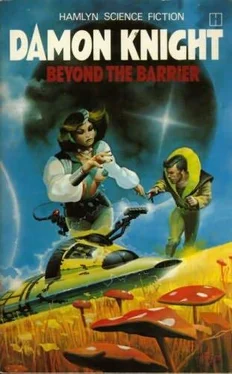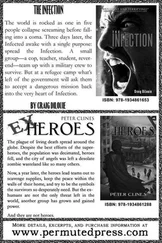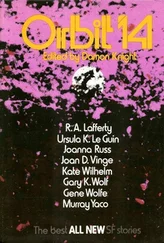Damon Knight - Beyond the Barrier
Здесь есть возможность читать онлайн «Damon Knight - Beyond the Barrier» весь текст электронной книги совершенно бесплатно (целиком полную версию без сокращений). В некоторых случаях можно слушать аудио, скачать через торрент в формате fb2 и присутствует краткое содержание. Год выпуска: 1964, Жанр: Фантастика и фэнтези, на английском языке. Описание произведения, (предисловие) а так же отзывы посетителей доступны на портале библиотеки ЛибКат.
- Название:Beyond the Barrier
- Автор:
- Жанр:
- Год:1964
- ISBN:нет данных
- Рейтинг книги:3 / 5. Голосов: 1
-
Избранное:Добавить в избранное
- Отзывы:
-
Ваша оценка:
- 60
- 1
- 2
- 3
- 4
- 5
Beyond the Barrier: краткое содержание, описание и аннотация
Предлагаем к чтению аннотацию, описание, краткое содержание или предисловие (зависит от того, что написал сам автор книги «Beyond the Barrier»). Если вы не нашли необходимую информацию о книге — напишите в комментариях, мы постараемся отыскать её.
Serialized originally in 3 parts: Dec. 1963, Jan. 1964, April 1964 editions of
Beyond the Barrier — читать онлайн бесплатно полную книгу (весь текст) целиком
Ниже представлен текст книги, разбитый по страницам. Система сохранения места последней прочитанной страницы, позволяет с удобством читать онлайн бесплатно книгу «Beyond the Barrier», без необходимости каждый раз заново искать на чём Вы остановились. Поставьте закладку, и сможете в любой момент перейти на страницу, на которой закончили чтение.
Интервал:
Закладка:
He got off at the University stop, walked to the Science Building in bright sunlight. A few students he passed stopped and looked after him; but he met no one he knew well, and no one spoke to him.
As he climbed the rear stair to the classrooms, he met jittery Donald Klemperer coming down, followed by a young preparator named Irving; both were wearing lab smocks, and looked startled to see him. Klemperer was the youngest member of the Physics Department, an anxious, blinking youngster.
Irving was dark, heavy and placid.
“Oh, uh. Professor Naismith,” Klemperer stammered. “Professor Orvile said—”
“Have you been taking over my classes?” Naismith asked pleasantly, continuing to climb the stairs past them.
“Yes, yes, I am, but what I wanted to say—”
“How did the demonstration go today?” Naismith was at the head of the stairs, turning his head to look back. Klemperer and Irving, craning up, both had their mouths open.
“All right, ah, pretty well, but—”
“That’s good, keep it up.” Naismith started briskly down the hall.
“But Professor Orvile said if I saw you, I was to be sure and get your key!” Klemperer wailed.
Naismith did not answer. He unlocked the door of the duplicator room, slipped inside, slammed it behind him. Reacting to his presence, the lights slowly glowed on.
He looked around the room, examining the familiar equipment as if he had never seen it before. The duplicator mechanism, in three metal cases grouped against one wall, and in the two units above and below the object platform, was a standard nine-gang Hivert Duplicator outfit. It had an object field six feet in radius, here marked off by a low railing. The table and apparatus were set up much as he had left them: the tank, the tau accumulator, the release mechanism, now pushed to one side. Several items had been added: a photometer and interferometer, a small theodolite, some prisms, the usual equipment for demonstrating the optical properties of quasi-matter. In addition, the heavy base-plate of a hydraulic jack had been bolted to the floor, and a small traveling crane had been positioned to take the weight of the tank when the table was removed.
Naismith recognized the preparations for the third in the series of quasi-matter demonstrations; Klemperer and Irving must have been setting them up just before he arrived.
He glanced thoughtfully at the tank itself. The liquid inside, still in the quasi-matter state, reflected light like a tankful of mercury. The reflections of the walls, the door and the equipment around the room were distorted by the tank’s curvature, and by something else. From where he stood, Naismith could clearly see the image of the duplicator machinery on the wall to his left, whereas his own reflection was a barely visible stripe at the right rim of the tank.
With some difficulty, he got the front panels off all three units of the control mechanism, and examined the massed tubes and wiring inside. He was not an expert on the Hivert, but was generally familiar with its design, and as far as he could tell, there were no signs of anything unusual. The units in floor and ceiling were less readily accessible, but both were thick with dust and grime: obviously they had not been opened for months.
His ears caught a faint click, and he turned in time to see the door swing open.
In the doorway stood two broad men in maroon jackets.
Light glinted from the guns in their hands. “Hold it!” said one sharply.
Caught off balance, with no time to think, Naismith instinctively slammed one hand down onto the light button on the control pedestal. He pivoted in the same motion and kept going, while the room lights winked out and the room darkened, except for the broken shaft of illumination from the doorway.
Someone shouted. Naismith was moving fast, swinging around the corner of the table. There was a deafening roar as one of the guns went off; then Naismith was crouching, sheltered by the tank. Only two or three seconds had gone by.
In the ringing silence, one of the men called thinly, “Come out of there, Naismith! You can’t make it—there’s only one door!”
By the flickering of the light from the doorway, Naismith could tell that both men had come farther into the room, moving apart, one to each side. Poised and alert, his heart thudding steadily, Naismith was able to think with cold precision: The tank rotates momentum 90° counterclockwise.
Both hands went quickly to the tabletop. One closed on the heavy brass theodolite, the other snatched up two of the prisms.
In his mind he was keeping track of the two men’s positions, diagramming them like an elementary problem in trigonometry.
He waited until the last instant, then sprang up and threw the prisms at the man on his right.
The room roared again, with a volume of sound that made the walls shiver and hurt his eardrums. The glass tank dissolved into a hundred fragments, but the silvery cylinder of quasi-matter stood unchanged. As he ducked down behind the tank, Naismith heard the shots continue: three, four….
There was a faint clatter and a thump from the other side of the room, to his left.
Naismith risked a look: the man on his left was kneeling, arms crossed tightly over his stomach, head forward. His gun was on the floor. The man swayed and began to topple.
Naismith gathered himself, swung the heavy theodolite over the table with all his force, and instantly followed it, vaulting the table. The second man was down, off balance, having ducked to avoid the missile. He snapped one shot at Naismith, filling the room with sound: then Naismith was on top of him.
Naismith felt a brief shock in one hand, and the man was sprawling limply under him, his neck unnaturally bent.
Naismith was up again almost without a pause, running out the door, past the white faces of Klemperer and Orvile; then down the stairs, out into the sunshine. He discovered that he was bleeding freely from a cut on one cheek, probably where one of the slivers of glass had struck him.
Realizing abruptly how fast he had been moving, he forced himself to walk at a normal pace across the lawns toward the tube entrance. A few students were gathered around a gray and blue copter parked on the lawn: the bubble was empty, the blades still. On impulse, Naismith went that way. A prickle of uneasiness went up his spine as he walked. It had been too quick: he had not had time to do more than act instinctively.
There had been a threat to his life; he had met it with the means at hand, making one of his attackers shoot the other, by de-flection from the kinetically inert quasi-matter. If he had thought at all, he had assumed the two men were gunsters hired by Lall and Churan. But…
He was at the copter, ignoring the students who turned to stare. Inside the bubble, a radio voice was muttering indistinguishably. Naismith opened the door, stepped up and leaned his head in to listen.
The uniformed patrolman in the tiny visiscreen was saying:
“… detention and interrogation. This man is wanted for the murder of Dr. Claude R. Wells, a psychiatrist at the University of California in Los Angeles. Wells was battered to death, and his office completely wrecked an hour ago. Naismith is considered extremely dangerous. He is not known to be armed, but is to be approached with caution. His description again, W.M.A., six feet two inches…”
The last words barely registered. Naismith turned away, with a roaring of doom in his head. When they saw his face, the students looked alarmed and backed off. He went through them, past them, moving like a somnambulist.
He could not even reject what he had heard in disbelief. He had realized instantly at the first words from the copter radio, that he had no memory of Wells at all beyond that frightening unseen thing that had come up out of his childhood. After that, a blank.
Читать дальшеИнтервал:
Закладка:
Похожие книги на «Beyond the Barrier»
Представляем Вашему вниманию похожие книги на «Beyond the Barrier» списком для выбора. Мы отобрали схожую по названию и смыслу литературу в надежде предоставить читателям больше вариантов отыскать новые, интересные, ещё непрочитанные произведения.
Обсуждение, отзывы о книге «Beyond the Barrier» и просто собственные мнения читателей. Оставьте ваши комментарии, напишите, что Вы думаете о произведении, его смысле или главных героях. Укажите что конкретно понравилось, а что нет, и почему Вы так считаете.










